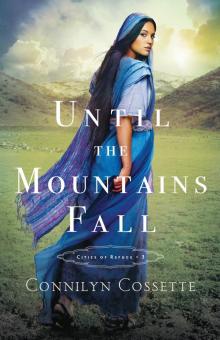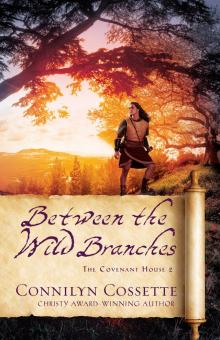- Home
- Connilyn Cossette
To Dwell among Cedars Page 8
To Dwell among Cedars Read online
Page 8
I let the rock slip from my fingers and closed my eyes, allowing the new song that had been stirring in my belly for weeks to pour from my mouth and diving into the pool of delight I always found when I blocked the world around me to create music.
For as uninspired as I was by thoughts of my future Levitical duties, the fact that the men of my lineage were descended from some of the first musicians to worship in the Mishkan in the wilderness was a point of great pride. I could endure any tedious task for the privilege of learning the sacred songs and instrument-making techniques they’d passed from generation to generation.
Pausing to consider where the melody of my new song might go next, I took a breath, but just as the next flurry of notes came to mind, a whisper at my back startled me into awareness of my surroundings. Spinning around with my heart pounding against my ribs, I leaped from my perch on the low wall and drew my small flint knife from my belt.
All was silent again as I searched the deep shadows beneath the spreading oak tree, confused as my gaze found nothing but dirt and weeds. I’d heard a voice; I was certain of it. The hair on the back of my neck rose as I glanced back toward the Levites, remembering another of those impossible tales I’d been told about a young boy named Samuel, who’d heard the voice of Yahweh call his name. I nearly laughed at myself for the wild comparison. The maker of the universe did not speak to little boys, and he certainly did not speak to me.
Something scuffed against the backside of the stone wall. Praying it was some small animal scrabbling about for food and not a stray Philistine lying in wait, I crouched down, then slowly crept along the base of the wall with my pulse throbbing in my ears.
Taking a deep breath and gripping my knife tight, I peered around the end of the wall with my stomach looped into a hundred knots. There, huddled against the stone fence, were two bedraggled children, clutching each other with terror-stricken expressions on their pale, dirty faces as they looked back at me.
Letting out a shuddering breath mixed with a self-deprecating laugh, I put my knife back in its sheath. “It’s all right. I won’t hurt you.”
The oldest—a girl of perhaps twelve or thirteen with the most enormous green eyes I’d ever seen—pulled the younger child closer to her side. Perhaps they were survivors from the terrible happenings during the storm last night. If so, then they must have been horrified by the sight of seventy men being struck by fire from the sky.
Compassion bloomed in my chest. I took a few cautious steps forward, palms upraised. “I mean you no harm.”
The girl shrank back at my proximity, but the boy’s jaw hardened and he shifted his body slightly, as if preparing to protect his companion from me. I suppressed a smile at his mettle. He could not be more than nine or ten, a full eight years younger than me, but it was clear that he was willing to engage me to protect the girl—his sister, most likely, by the striking resemblance between the two.
“Are you from Beth Shemesh?” I asked, gesturing over my shoulder.
After a long pause, the girl shook her head. The fertile valleys within the shephelah contained any number of small farming hamlets that they might have wandered away from.
“Another village?”
The girl gripped the boy’s tunic in a tight fist, either to hold him back or to reassure herself, her gaze flitting around the hills. Then, to my amazement, she lifted a trembling finger and pointed toward the western horizon, speaking in a small but sweet voice laden with an unfamiliar accent. “Ashdod. Near the sea.”
I could not have been more shocked than if the lightning had returned at that moment to strike me down as well. These children were Philistines?
“But . . . but you speak my language,” I spluttered out, my mind flailing about for an explanation as to why they would be in Yehudite territory. I knew Ashdod to be one of the largest of the enemy strongholds, a major port city, and at least two days’ walk from here.
“Azuvah—” she stopped herself, blinking a few times before she continued. “A slave spoke your words to my brother and me.”
“You are far from home. How have you come to be here?” I swept my eyes around the valley, instinctively searching out enemies among the many shadows on the thick-wooded hillsides.
Her long lashes fluttered before her deep green eyes met mine with shy determination. “We followed the box. The kings left, but we stayed.”
Stricken by the odd statement, I opened my mouth to ask more but someone called my name, drawing my attention away. My uncle Abiram waved to me from twenty paces off, gesturing for me to return.
“That is my uncle,” I said to the two children still huddled like field mice against the wall. “He will want to meet you.”
The girl let out a small gasp, fearful of yet another stranger discovering their hiding place.
“You have no cause for alarm,” I said, gentling my tone even further. “Neither one of us will harm you. I vow it in the name of Yahweh, the Holy One.”
By the time Abiram neared the tumbled-down sheepfold, a heavy dose of concern lay within his confused gaze. He frowned as his steps slowed. “What is it? Another body?”
“No,” I replied, waving him over. “Come see for yourself.”
Cautiously he came around the end of the stone wall, then stopped short when he saw the children. “Whose young ones are these?”
“That is just the thing. They claim to be Philistines. From Ashdod.”
My uncle’s jaw slackened as he examined them more closely. “How did they come to be in Beth Shemesh?”
“They say they followed the Ark. And remained when the kings left.”
“The kings . . . ?”
I shrugged, having no more understanding than he of what the girl meant by that statement.
Abiram pulled me a few steps away and lowered his voice. “What else have they told you? Did they see what happened here?”
“I don’t know. I only just discovered them hiding behind the wall.”
Turning back to gaze across the valley, he hummed and stroked his graying beard, a habit he turned to whenever mulling over a tangled issue. “The Ark is secure, and the bodies have been removed. We are returning to Kiryat-Yearim for the time being to discuss the next steps. But if they were witnesses to this ”—his palm fluttered in the air behind him—“then I am certain Abinidab will want to speak with them, no matter what their heritage is. Perhaps they can give us more clarity about where the Ark came from and why.” He lowered his chin, pinning me with a pointed stare. “See if you can find out more while I fetch the others.”
“They are frightened. I’m not certain they will tell me much. The girl seems quite reticent, and I don’t know that the boy can even speak our language.”
“You have a knack for these things, Ronen. You’ll think of something.”
Before I could argue with his assertion, Abiram walked away, determination in his stride as he went to retrieve the other Levites. Turning back to the children, I sighed, rubbing my forehead. They looked back at me with curious expressions, and I wondered how much of the conversation they’d overheard or understood. Thinking to make myself appear less threatening, I took a seat on the ground a few paces away.
“I come from a village far from here as well,” I said, hoping to ease them into revealing more. “Up near Shiloh. Have you heard of it?”
The girl nodded, gesturing with her chin toward the northeast. “Your gold box is from there.”
I lifted my brows in surprise. “That is right. It resided within the Mishkan for hundreds of years.”
“Mishkan?” she echoed.
“Our holy sanctuary for as long as our people have lived in this land. It began as an enormous tent constructed in the wilderness—”
“By Mosheh,” she interrupted.
“Yes,” I said, stunned that she knew anything of our history. “Mosheh instructed the people to build the tent after our people were freed from slavery in Egypt. I am from the line of Levi, the men tasked with caring for that sanctu
ary and all its implements.”
Her brow furrowed. “But you are here.”
I tilted my chin, studying her face for a moment. Distracted at first by the shock of her presence, I’d missed the foreignness of her features—the paleness of her skin, the shimmering golden tones in her light brown hair, wide-set eyes the color of a sunlit forest—but the closer I looked, the more I could see that these children did somewhat resemble the few Philistines I’d seen in the last few years, either traveling on roads through our territory or passing through the marketplace in Shiloh before the war. No matter that our two peoples were constantly at odds—and theirs had vowed long ago to wipe us from this land—trade and intermingling between us and our enemies was commonplace. Far too much so.
“Your people destroyed it,” I said, working hard to contain my bitterness as I thought of the way the Philistines had marched into Shiloh and razed the holy places only a few days after cutting down thousands of our men. “There is little left of the city, and the stone walls that once protected the Mishkan were torn down.”
Her dark eyelashes fluttered. “This would make Azuvah very sad.” Her tone indicated that the revelation disappointed her as well, which made no sense coming from the child of our sworn enemies.
“Who is this woman you speak of? The one who taught you our language?”
“She cared for my brother and me.” She placed a possessive hand on his shoulder. “Our mother died when Lukio was born, and our father is . . . he is gone. But Azuvah protected us. Taught us many things. Even your words and stories.”
“And where is she now?”
She pressed her lips together, those green eyes shimmering as she shook her head and darted a glance at Lukio. She must not want him to know that the slave was dead, so I said nothing.
“And the rest of your family? Do you not need to return to them?”
“They are gone too. The plagues from your golden box took them.”
We’d heard rumors that some sort of tragedy had befallen Ashdod. A few Hebrew tradesmen returned from the coast with stories about an epidemic and widespread famine, but this was the first I’d heard of the Ark being accused of causing them.
“My uncle thinks our leader would like to speak with you. Are you willing?”
Her face seemed to pale further, and her eyes grew impossibly large.
I placed a palm on my chest. “I promise, no one will lay a hand on you. We are men set aside for service to our God. Men of peace, not soldiers. Abinidab will only want to hear your story.”
The girl shifted, her gaze downcast as she fidgeted with a clump of grass near her knee, but Lukio’s eyes were pinned on the center of my chest, where a keepsake hung from a leather strap. I noticed that his eyes were mismatched, one walnut brown and the other similar to his sister’s eye color.
“Do you like this?” I asked, seizing on the distraction as his sister contemplated my request.
He did not answer, but curiosity seemed to override his wariness as he peered at the necklace. I lifted the pendant to give him a clearer view. “This is very special.”
“What is it?” The question was spoken with a boyish huskiness, foretelling a voice that would eventually deepen to a low rasp in the years to come.
“A lion’s claw. My great-great-grandfather Remiel killed the beast when it attacked his camp during a hunt. It stalked them for three days, keeping mostly out of sight. But just when they thought it had disappeared, the beast pounced on one of the men that strayed from the fire late at night. Remiel heard the shriek and took up his dagger, racing toward the commotion.”
Fascinated, Lukio was now leaning forward, his brows high in a silent invitation to continue my tale.
“Although the lion was fearsome, my forefather prevailed, emerging from the fight with only a few scratches. The other man survived too, though without the use of his arm. This claw”—I wrapped my fingers around the treasure—“was saved as a reminder of that day. It is said that anyone who wears it is blessed with divine protection, along with those around him.”
Though I believed the idea of a protective charm to be nothing more than another of the myths I’d been told in my lifetime, I could not restrain the irrational guilt that, had my father not given it to me the day he left to guard the Ark, he and my brothers might still be alive.
Movement from the corner of my eye announced the return of my uncle, along with Abinidab and his eldest son, Elazar. “They are here,” I said to the girl. “Will you come out and speak with them?”
She clutched at her brother, her breaths coming faster, but Lukio murmured something to her in their language, his tone indicating that my storytelling had smoothed the sharper edges from his wariness.
“Abinidab is a kind man, I assure you. Besides . . .” I patted the lion claw with a wink at Lukio. “You will be safe with me.”
They exchanged a few foreign words before they stood in tandem, both of them taller than I’d expected, making me wonder if perhaps I’d guessed their ages incorrectly. When they followed me around the stone wall toward the four white-clad Levites, the girl favored her left leg, her face pinched with each step. Lukio kept close to her side, sliding worried looks at his sister every so often, his protectiveness in full bloom, no matter his age.
Abinidab smiled broadly, his eyes crinkling as he regarded our approach with gentle curiosity. I’d enjoyed only a few brief moments in the older man’s presence since we’d come to Kiryat-Yearim, but I’d never met a more kind and good-natured soul. He was the most widely respected Levite elder in the territory of Yehudah, both for his long service at the Mishkan under the leadership of Eli and his commitment to preserving our way of life after the High Priest’s death and the destruction of our holy sanctuary.
“Young Ronen,” he said as we met in the middle, “who have you found?”
The children stood together, hands entwined. Whatever headway I’d made in gaining Lukio’s trust looked to have melted away. His jaw was set, eyes wary, and his stance full of tension.
“Lukio and . . .” Realizing I’d not asked her name, I turned to the girl with lifted brows.
“Arisa.” The name was offered barely above a whisper.
Abinidab gave them both a warm smile. “I have been told that you are from Ashdod. Is this true?”
Arisa’s eyes bounced to me for a moment before she nodded. “Yes, my lord,” she said, her gaze downcast again.
“And how did you come to be in this valley?” he asked, tilting his ear to hear her soft answer.
She swallowed hard, a pinch forming between her brows. “We followed the Ark, my lord, and the kings of the Five Cities as they trailed after it in their chariots.” She pointed to a ridge on one of the hills at our backs. “The kings watched from up there until the men removed the box from the cart. And then they left.”
“Why did you stay, child?”
For the first time, Arisa lifted her eyes to meet Abinidab’s stare. “Because I was told to stay with the Ark until it dwells among the cedars in peace.”
Abinidab’s lips parted on an audible exhale. “Among the cedars?” he echoed.
Arisa nodded, her gaze once again on her dusty toes.
The old Levite was quiet for a long while, studying the two children and then looking back to where the Ark awaited transport to Kiryat-Yearim. “I would very much like to hear more about what happened in Ashdod over these past months, Arisa. Will you join us this evening at our camp and tell me?”
Lukio scowled at the suggestion, again muttering something in his own tongue that sounded distinctly belligerent.
“We will make sure the two of you are safe and fed,” promised Abinidab. “And whenever you desire to return to your own territory afterward, I will appoint an escort to transport you back to Ashdod. You are not our captives, my young friends, but honored guests.” He pressed a hand to the center of his chest. “This is an invitation, not a demand. You are free to go now if that is what you wish.”
Arisa cont
emplated, her green eyes roving the valley, glancing off me and then her frowning younger brother, and finally landing on the linen-covered chest on the horizon. Her slender shoulders straightened, determination in the lift of her small chin even as her voice quavered like a wounded bird’s. “Where the Ark goes, we will follow.”
Ten
The camp was made in the valley, with a few of the Levites appointed to guard the Ark on the boulder a thousand cubits away. Although the people of Beth Shemesh were in deep mourning for the losses they’d suffered, they were so grateful for the retrieval of the bodies and our willingness to remove the Ark from their midst that a group of women appeared just before the sun set with basketfuls of food and drink.
The offering was taken with solemn humility, Abinidab expressing his sincere regret for the lives that had been lost, while refraining from speaking any words of censure. My uncle had told me that the lid of the sacred chest was askew when we arrived, making it clear that the men from Beth Shemesh had taken it upon themselves to look inside—a grievous mishandling, and one that, as Levites, they should have known not to do. I was doubtful that their transgression had brought about their collective demise, whether they touched the box or not.
Although I was fiercely curious to hear the rest of Arisa and Lukio’s story, I’d been tasked by my uncle to retrieve firewood and help prepare the camp. I bristled at the dismissal and the attitude that I was too young to take part in the discussion surrounding the children when I’d been the one to come across them in the first place. However, I was not yet of age to be counted among the active Levites, and since I would be in training for the next seven years, both in Torah instruction and my duties, I was therefore bound to obey my uncle’s every command. And as much as it grated to do so, I would gulp down my pride, haul water and wood, clean tools, and perform any other menial task for the sake of my father and brothers, who’d desired nothing more than for me to join them in the work they treasured.

 Until the Mountains Fall
Until the Mountains Fall Between the Wild Branches
Between the Wild Branches To Dwell among Cedars
To Dwell among Cedars Counted With the Stars
Counted With the Stars Shelter of the Most High
Shelter of the Most High Shadow of the Storm
Shadow of the Storm A Light on the Hill
A Light on the Hill Wings of the Wind
Wings of the Wind